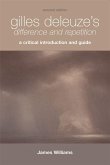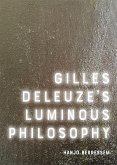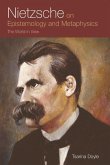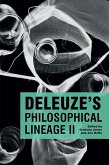This marks the first critical study of "The Logic of Sense," Gilles Deleuze's most important work on language and ethics and a vital source for his philosophy of the event. Deleuze's thought always promised a revolution in ethical theories and the relation between language, idea, and action. James William's critical reading conveys the potential and risks of Deleuze's response to the excitement and danger of events. His interpretation engages thoroughly with "The Logic of Sense," touching on phenomenology, an analytic philosophy of language, stoicism, literary theory, and psychoanalysis. His critique illuminates all areas of Deleuze's work in philosophy, politics, literature, linguistics, and sociology.
James Williams has an amazing talent for extracting simple and important questions out of an apparently abstruse argument. He does so at regular intervals, so that the reader is able to grasp Deleuze's argument as it unfolds. This book will be essential reading for whoever wants to master Deleuze's philosophical project. Jean-Jacques Lecercle, University of Nanterre, Paris This is the first critical study of The Logic of Sense, Gilles Deleuze's most important work on language and ethics, as well as the main source of his vital philosophy of the event. James Williams explains the originality of Deleuze's work with careful definitions of all his innovative terms and a detailed description of the complex structure he constructs. This reading makes connections to his ground-breaking work on literature, to his critical but also progressive relation to the sciences, and to his controversial denial of the priority of standard logics, human values and 'meaning' in thinking. This book will open new debates and develop current ones around Deleuze's work in philosophy, politics, literature, linguistics, cultural studies and sociology.
James Williams has an amazing talent for extracting simple and important questions out of an apparently abstruse argument. He does so at regular intervals, so that the reader is able to grasp Deleuze's argument as it unfolds. This book will be essential reading for whoever wants to master Deleuze's philosophical project. Jean-Jacques Lecercle, University of Nanterre, Paris This is the first critical study of The Logic of Sense, Gilles Deleuze's most important work on language and ethics, as well as the main source of his vital philosophy of the event. James Williams explains the originality of Deleuze's work with careful definitions of all his innovative terms and a detailed description of the complex structure he constructs. This reading makes connections to his ground-breaking work on literature, to his critical but also progressive relation to the sciences, and to his controversial denial of the priority of standard logics, human values and 'meaning' in thinking. This book will open new debates and develop current ones around Deleuze's work in philosophy, politics, literature, linguistics, cultural studies and sociology.








